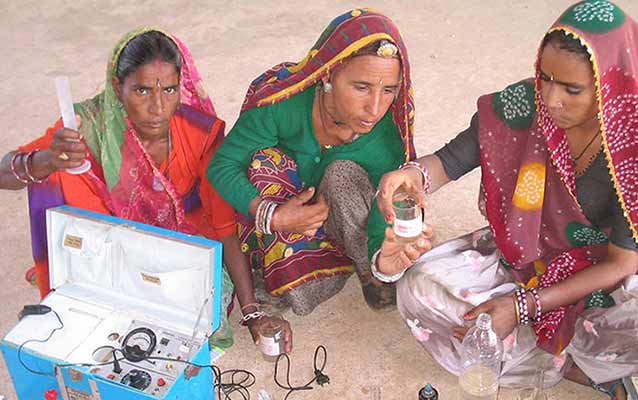Barefoot College: Empowering rural women through sustainable development programmes
We all think about doing something for the community but here we have a group of individuals who like us do not crib every night and day, wishing that someone on their behalf would bring about the change. These revolutionary thinkers are themselves the change which we all wish to see.
The story began in 1965 when Sanjit Bunker Roy volunteered to spend the summer working with famine affected people in Palamu district of Bihar (now known as Jharkhand). Having always lived in an urban household, he had no idea what it was like to live in poverty and destitution. This experience changed him, and he felt determined to fight poverty and inequality and thus, emerged the idea of SWRC (Social Works and Research Centre), Tilonia.
Following this in 1972, Meghraj from Tilonia village and Bunker Roy, a fresh graduate from Delhi University, became friends and shared a dream grafting formal urban knowledge on rural wisdom to create a world without want. Anil Bordia the then collector of Ajmer helped them by leasing an abandoned Tuberculosis Sanatorium premises from the Government at Re 1 a month in Tilonia.
In 1973, a Geophysicist from IIT Kharagpur, Kamal Roy became the first professional to join Bunker in his initiative. Other people who became part of this movement for change were Manya and Shukla from TISS.
Barefoot College: Why it was established
Barefoot College is a non-governmental organization that has been providing basic services and solutions to problems in rural communities for more than 40 years, with the objective of making them self-sufficient and sustainable. The official website states, “Barefoot solutions can be broadly categorized into the delivery of Solar Electrification, Clean Water, Education, Livelihood Development, and Activism. With a geographic focus on the Least Developed Countries (LDCs), we believe strongly in Empowering Women as agents of sustainable change.”
The Barefoot College has tried to train rural women, in areas that have traditionally been dominated by men. “Since 1972, more than 6,525 unassuming housewives, mothers & grandmothers, midwives, farmers, daily wage labourers and small shopkeepers, who represent the profile of rural women from poor agricultural communities, have been trained as Barefoot midwives, handpump mechanics, solar engineers, artisans, weavers, balsevika (crèche teachers), parabolic solar cooker engineers, FM radio operators and fabricators, dentist, masons, and day and night school teachers”, states the official website. The college gives preference to training of single mothers, middle-aged, divorced, physically challenged or illiterate women because it is felt that they need employment opportunities as well as steady income the most.
Barefoot College: Initiatives
Some of the initiatives undertaken by Barefoot College are:
Educational Solutions: The College trades formal classroom teaching for hands-on learning-by-doing process of gaining knowledge and skills. The College has also set up night schools so as to educate girls who are not able to attend day classes due to their household chores.
| Total Attendance in Night School since 1975 = 75,000
Total number of Barefoot teachers in government schools = 14,000
Total no. of children currently attending night schools = 7,500
Percentage of night school students that are girls = 80% |
Some of the education solutions on offer at Barefoot College are:
- Balwadis (Rural Creches)
- Solar Bridge Schools
- Bridge Transition Schools
- Day School
Solar Solutions: Since 1989, Barefoot College has been training villagers in harnessing the sun’s energy to help rural communities thrive by applying solutions in four critical areas of village life such as solar electrification of 1000+ villages, hot water, solar cookers and fresh drinking water through solar powered desalination.
| Total number of rural people getting light = 450,000
|
Some solar solutions on offer at Barefoot College are:
- Solar Lighting
- Parabolic Solar Cooker
- Solar Water Heater
- Solar Powered Water Desalination
Water Solutions: Rural communities throughout India and the rest of the southern hemisphere, often suffer from water scarcity, droughts and a lack of clean water sources for sanitation, drinking and cooking. Barefoot College has been providing sustainable community-based water sources using the following guiding principles – decentralisation of water sources, replenishment of water tables, participation of rural communities in implementation, reduced dependency on external aid and fair treatment of women and children, who are the worst affected by water problems like poor hygiene and accessibility. Since 1991, the College has been training people in rain water harvesting and has helped harvest 99 million litres of fresh water.
| Total number of schools and community centers with access to water = 1,521
|
Some water solutions offered by Barefoot College are:
- Rainwater Harvesting
- Dams
- Desalination Plant
- Neer Jaal

